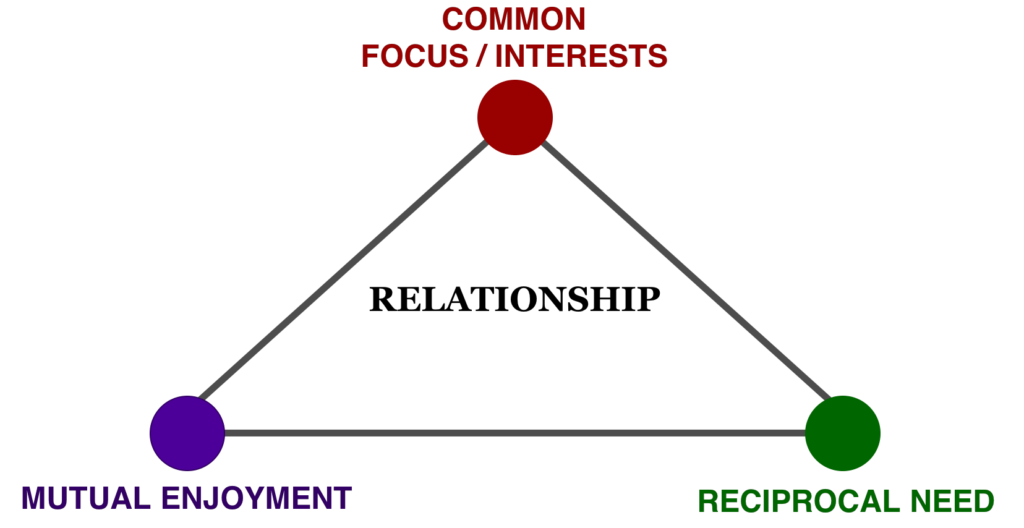[This article is also available on the Pondering Purple podcast. Simply search for it by name on your preferred podcast platform or listen online HERE.]
“One of my favorite moments in Star Trek is when Captain Kirk looks over the cosmos and says, ‘Somewhere out there, someone is saying the three most beautiful words in any language.’ Of course, your heart rises and you think it’s going to be, ‘I love you.’ But he says, ‘Please help me.’ What a philosophically fantastic idea, that need is a beautiful thing.” Hugh Laurie

Need? A beautiful thing? The statement doesn’t sit well with me—mostly because I’ve spent the better part of my lifetime trying to avoid the trait.
Need? A beautiful thing? When I first read the statement, it didn’t sit well with me, mostly because—I realize now—I’ve spent the better part of my lifetime trying to avoid Need.
The decades I’ve spent serving MKs indicate that I’m not the only one in this people group for whom the Gift of Need has become something a defining fear—whether we’re conscious of it or not. This “needlessless” certainly doesn’t apply to all MKs, but it does to enough of us that I think it’s worth exploring, if only to be able see it in ourselves or the MKs we love, and then to address it in order to prevent some of the fallout that can happen when we decide that Need is overrated.
I think the tendency of many MKs to avoid feeling a strong sense of need is directly correlated to the losses we experience. There’s no denying that TCKs in general are subjected to more significant goodbyes by the age of 18 than most of our peers. (See these articles for further information about the impact of grief on our friendships and outlooks.)
What I haven’t discussed yet, perhaps because it’s a deficiency of mine, is how repeated losses can affect our ability to need. Not everyone responds by choosing to avoid it altogether, but for those of us who do, the consequences are predictable and can be grim.
Here’s how it works:
The first few losses of our nomadic lives take us by surprise. Children are optimists by nature, and many of us assume, in our early grief, that the newest friend will stick around or that this time I won’t be the one to leave.

Then comes the next departure, the next wrenching tug at already frayed heart-strings. As time goes on, the farewell tears become more bitter—acidified by an inevitability we can’t seem to control.
Years pass. The more we lose, the broader the wound feels.
So we retreat into the fortresses we build. These emotional strongholds intended to survive successive blows—to protect our fragility. Their walls are thick, their dungeons deep. So deep that Need—that need we don’t want to feel anymore—can scream itself hoarse and not be sensed or heard.
We mask our invisible walls with friendly smiles and skillful interactions, using our innate adaptability to conquer social tests. We soften just enough to mimic true connection. But at the end of the day, we run back to our safer fortress and watch, out of sight, as people less cautious than ourselves dare to encounter, explore, embrace—depend.
We try to ignore the voice of Need calling for attention from deep inside our self-protection. We want neither the discomfort nor the disappointment it can foster. We feel strong—unbreakable—as long as it is muted. No more loves lost or relationships ended. None that matter, anyway.
We’ve sacrificed the Gift of Need to the comfort of isolation.

Don’t get me wrong. We’re fine with Need as long as it’s someone else’s. We’ll fly in and rescue others at a moment’s notice, telling ourselves, “This proves that I’m okay—I’m able to engage.”
We settle for relationships in which others need us, but we need no one. In which others confide in us, but we confess to no one. In which others trust us, but we depend on no one.
Because life or God or circumstances have stolen our willingness to love and lose again. Even in marriage, I’ve seen MKs avoid vulnerability to sidestep the pain that shaped their isolation.
The occasional friendship may sneak past our defenses. We might whisper to ourselves, a bit reluctantly, “Maybe just this once.” And we hope that the loss, if or when it comes, won’t kill us. But mostly we hang back, observe and try not to feel lonely.
We’ve conquered vulnerability and won a safe and shielded kind if solitude.
Yet love—true, meaningful love—requires that we Need.

Relationship is a three-legged construct: one part common interests or focus, one part mutual enjoyment and the last part is reciprocal need. Without that need, we create a flimsy bond of similarities and pleasure, but leave out the impulse that draws us back to each other and fuels our willingness to risk intimacy.
And yet…it’s so easy to fall into a rejection of dependence.
Growing up in the goodbye-saturated world of ministry, I learned at a young age—when heartbreak drove me to a dangerous kind of sadness—that I’d have to be more careful with my Need.
I became an adult who picked her friends cautiously. As years stretched on and they didn’t leave, I allowed myself just a little bit more Need. When those friends honored it and returned it, I surrendered a bit more.
Then life broadsided me. Three of my strongest, most meaningful friendships ended abruptly. One to death, one to distance and one to something that felt like rejection.
I became angry with myself for having dared to hope and, quite predictably, began to re-erect the fortress of my youth. It didn’t take as long this time. Its walls and silence were familiar to me.

Here’s how I was forced, eventually, to acknowledge how very toxic needlessness can be. Safe—yes—but so crippling too. A few years ago, when unbearable pain made me rush to the hospital in the middle of the night and I slumped in a wheelchair for three hours waiting to see a doctor, I didn’t make a call. I had friends, but I didn’t make a call. I sat and moaned and tried not to pass out as my body became septic…but I didn’t make a call. And honestly—sadly—I took ridiculous pride in proving to myself that I could live above my Need.
Looking back today, I can see the countless other ways, some insignificant, some important, in which I’ve failed to “make the call.”
I realize now that I built a shrine to independence on the quicksand of my Need.
Hoping to control it.
Hoping to quell it.
Hoping to eliminate it.
My case is not unique. The MK world in which I live is populated with survivors whose coping skills have led to a stunted form of Need. We manage to engage while preserving our isolation. It protects us from the losses that destabilized our youth. We think our self-denial will protect us from more pain.
But here’s the self-defeating bargain we make. Need stirs intimacy. Need fosters commitment. Need stimulates trust. It’s a facilitator, not a dictator. A connector, not an abuser. A necessity for friendship and, yes, a terrifying leap.

Of this I am sure: if there’s one thing the MK community values above all else, it’s relationship. Deep connection. Yet insidious fears based on the scars of our losses demand that we must live without it. And many times, even as adults, we relinquish what we crave the most, because the grieving child that still breathes inside us commands us not to risk.
The solution? It’s too complex for a single article, but I think it needs to start with self-talk that declares that we can live outside our walls. That we will live outside our walls. That we are risking hurting our hearts by doing so, but that the gains far outweigh the losses.
I believe that words matter. That they can change hearts, even my own. So I try to tell myself a variation of the following statements every time I feel the urge to tamp down my need and hide away in the safety of isolation. Here they are:
- I embrace the Need for connection God placed in me.
- I believe he placed it there to bless me, not to harm me.
- I choose not to let my childhood fears limit me in my adulthood.
- I will be cautious and brave as I risk pursuing meaningful friendship.
- I will not let initial failures deter me.
- I know that I am strong enough to overcome potential heartache.
- The process may be scary, but I was created with the Gift of Need and I trust that the rewards of friendship will outweigh the risks
If you know that you’ve been avoiding the gift of need, will you consider stepping into your courage and trying to make the shift from intense self-protection to hopeful self-fulfillment? I’m fairly new at it myself, but I promise you it’s already starting to feel worth it.
Please join the conversation!
- Contribute your thoughts in the comments section below
- Use the social media links to Like and Share this article
- Many of these articles are now available in podcast form. Simply search for “Pondering Purple” on your usual pod platforms, or click this link to be taken to its host page.
- To subscribe to this blog, email michelesblog@gmail.com and write “subscribe” in the subject line
- Pick up Of Stillness and Storm (my novel about a missionary calling gone awry) on Amazon



Shary
At age six I remember walking into my room in boarding school and thinking Now I have to take care of myself no one else is going to do it. I became very independent I could meet my own needs. Add to that is abandonment. My parents abandoned me not because they wanted to but that is what was required to answer God’s call on their lives. As a child I never asked my parents for anything. If I wanted it I thought I had to figure out how to get it myself. Fortunately my parents did meet most of my needs as a child. Though I thought I had to care for myself my biggest fear was abandonment. As I am still learning I can share my needs with those who care about me. But it still is not easy. Those deep down feelings of abandonment reinforce I have to take care of myself and can’t share my needs with other.
EC
I can definitely identify. I am thankful though for growth. My husband and I have had a major job/ life change this summer. I reached out, albeit online, not only to my family, bout also to two friends and a cousin. I also reached out in person to people around. Grief is more bearable when shared.
BB
A friend once told me/ don’t deny me the blessing of giving. It is a gift to receive love gratefully. I’ve learned to say thank you for those blessings.
E.A.
This article puts a finger exactly on something I have tried to figure out for years. Undertanding brings relief. Thank you.
Cilla May
“the farewell tears become more bitter—acidified by an inevitability we can’t seem to control.” Or you stop crying because you’ve shut down the emotions and can’t acknowledge the loss, as that would mean admitting you were needy.